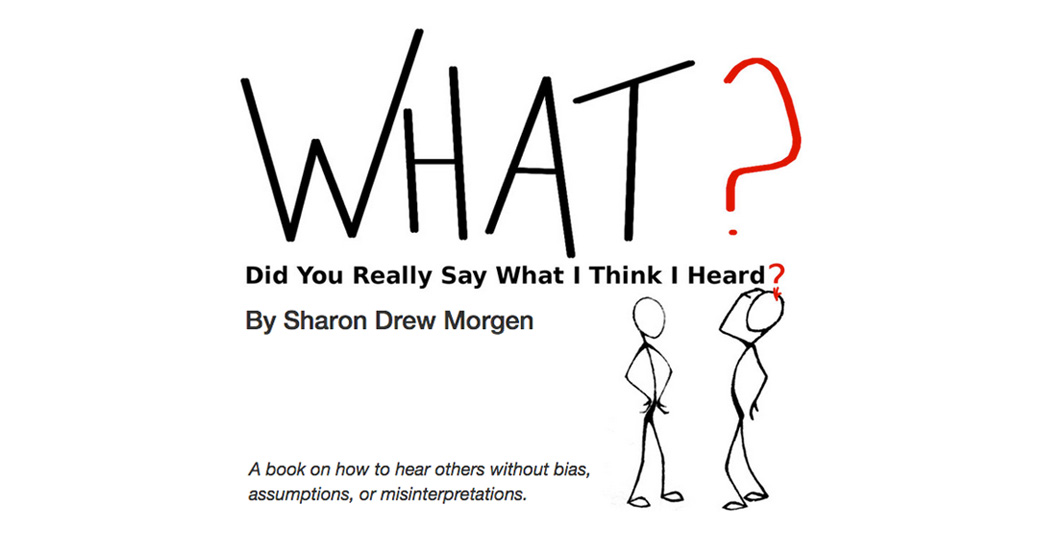Are Helpers Really Helping?
 If you are a therapist or coach, manager or consultant, you’ve been schooled to be a guide, a mentor, to help people find solutions they couldn’t find on their own.
If you are a therapist or coach, manager or consultant, you’ve been schooled to be a guide, a mentor, to help people find solutions they couldn’t find on their own.
During a recent conversation with a coach who prides himself on Always Being Right! (Clients who don’t heed him are told to go elsewhere.) and wondering who would choose him as their coach, I began thinking about how Helpers go about helping, and why clients often ignore their suggestions.
I believe there’s an ‘accepted practice’ problem here: Helping professionals use questions and ‘active listening’ to ‘understand’ the identified problem so they can then ‘help’ them find solutions. But – and I know this is an unusual thing to say – conventional questions are so biased by the goals of the Helper that they may not uncover accurate data, causing Helpers to sometimes offer unhelpful answers.
To add insult to injury, the way our brains ‘listen’ is biased by our history, regardless of what’s been said. In other words, through no fault of our own, neither client or Helper hear each other accurately! But none of it is purposeful: It’s our brain’s fault.
BEYOND THE BRAIN
So many of us – healthcare providers, sellers, coaches, leaders – truly want to help Others achieve their best outcomes. In this article, I’ll provide a much-simplified explanation of how brains cause our choices, explain where conventional skills fall short, and introduce you to new skills that can facilitate permanent change without resistance.
I’ll begin with the ‘big picture’ and explain how our brains cause us to do what we do, based on my decades developing systemic brain change models.
Simply, our brain is an enormous database that captures and organizes the data from our lives, stores it in circuits, and uses our mental models and history as the foundation from which to act.
Sharon-Drew’s new book coming out on 9/16/2023
Each of us operates from historic, unconscious, and unique neural configurations, stored as memory in 86 billion brain neurons that hold our history, our ideas, our values and from which our decisions and behaviors arise. Obviously, we each think and act uniquely. Obviously, no one else has access to our brain circuitry; no one else has our life story or history; no one else can ‘get in there’.
Technically, change occurs when brain components get reconfigured or new ones get formed. Behavior change is a brain issue.
HOW BRAINS STORE INFORMATION
I’ve spent decades unpacking how brains are organized and have developed several facilitation models that enable real choice (See How?), models that make it possible for Helpers to enable clients locate the neural circuits that initiated their problem and, by triggering and generating new synapses, reconfigure them.
And herein lie the problem Helpers face now: standard questions and usual listening practices steer the Other to where the Helper, using their own unconscious assumptions and curiosity thinks the answers should be and possibly miss where actual answers reside.
Once I realized this I began developing questioning and listening models that make it possible to get directly into the neural circuits and use brain change as their foundation. I also discarded my role as a Helper and became a Decision Facilitator, to facilitate Others to their own circuits easily develop new behaviors with no resistance.
WHAT IS CHANGE? NO, REALLY?
Change is systemic, not as simple as merely doing something different. Since behaviors are outputs from instructions sent by existing circuits, new behaviors need new neural circuits to send out new instructions for new outputs. Too often, Helpers merely try to change behaviors without changing where in the brain the new instructions will come from.
You see, any change request represents a difference, a threat to the existing system and as such, will cause resistance unless it’s been accepted first. This is the problem with noted change management models – they merely attempt behavior change.
It’s like trying to get a backward moving robot to move forward by explaining, questioning, and showing videos; the robot must be reprogrammed. Without taking this into account, by trying to change a behavior by trying to change a behavior without changing the neural circuits, people will resist, or not maintain, the change.
QUESTIONS AND LISTENING
Here are the reasons people have difficulty finding internal answers and making decisions.
Brains: The time it takes to figure out all the criteria needed to make a decision is the time it takes to act on it. No, they’re not dragging their feet; they’re trying to change congruently.
See, the brain’s 86 billion neurons are stored and labeled in ways that may be difficult to consciously access. In fact, words or ideas even enter brains as meaningless sound vibrations (Neuroscience actually calls words ‘puffs of air.’) which ultimately get turned into the signals that then get translated into meaning.
Let me explain the brain stuff that goes on. Hang in with me as it explains why we mishear and misunderstand. To begin with, our brain doesn’t accept spoken words accurately, as intended. It takes the sound vibrations, turns them into signals, and then finds existing ‘similar enough’ (historic, biased) circuits to translate the signals into meaning – a very inexact process.
To make the process fast (It takes five one hundredths of a second for the entire process.) our brain chooses the quickest route to translation circuits, almost always an oft-used superhighway that may only have a tangential connection to the original meaning and intent. In other words: all incoming words get translated without any regard to accuracy!
Most of us aren’t aware that our thoughts, realizations, understandings, are merely versions of what our brains have already translated for us.
Unfortunately, questions meant to ‘gather data’, are restricted by the Helper’s assumptions. Sometimes Others uncover the exact data we need in order to help them. But sometimes our questions direct the client’s brain to an unhelpful answer, and something more valuable remains unretrieved.
To help Others find precisely where the necessary data is stored, Helpers must have NO assumptions, NO biases, and NO belief that we have anyone’s answers. All we need is to send Others to the right circuits where their answers are stored. And for this, conventional skills don’t work. If you want to better understand exactly what goes on, read my new book How?
Listening: Given we all have a ‘brain circuit translation’ problem making it near impossible for anyone to listen without bias regardless of how well they ‘listen’.
To avoid biases and misinterpretations, to help Others discover where their answers are stored, Helpers must listen differently and don’t assume they ‘understand’ what’s been said. I actually developed a process called Listening for Systems, which bypasses our assumptions and hears what’s intended.
If you’d like to learn more I wrote a book on the subject: What? Did you really say what I think I heard?.
Questions: This one is the most uncomfortable for Helpers. Conventional questions are formulated to elicit data as per the needs, intent, languaging, curiosity of the Asker.
To this end, I spent 10 years inventing a new form of question (Facilitative Question) that foregoes data gathering per se and instead leads Others to the brain circuits and memory channels to precisely where the appropriate data is stored. If you go to my site I explain how I invented them and provide descriptions and articles.
By posing unbiased, systemic questions that lead brains to appropriate circuits, by listening without assumptions, by trusting everyone has their own answers, we can truly serve Others beyond any natural biases we might have.
The new job of Helpers is to begin with the assumption that clients may actually have perfectly good answers stored in some place where their brain isn’t looking.
HELPERS AREN’T HELPING
Unfortunately, these skills are not taught in coaching schools or MBA programs which continue to teach to ‘be aware’, be ‘open minded’, take a ‘different perspective’, do ‘active listening’, ask ‘probing’ questions to ‘give the Helper the information’ they need to ‘help’. But as you now know, neither standard questions or conventional listening will always collect accurate information.
When Helpers try to have answers for Others, our track record is spotty: clients use some of our suggestions and ignore others because they may not have gotten to the core (and unconscious) factors that caused the problem to begin with.
And because our advice ultimately brings Others up against their own inabilities, they push the Helper away regardless of the length or success of the relationship. Inadvertently, because no other way has been developed to professionally help Others, we infantilize our clients.
I know that most coaches, leaders, managers, and Helpers truly want to serve Others. Please consider shifting your goal and learn new tools. I’m happy to help. I’ve developed new skills for Helpers (coaches, sellers, managers, healthcare providers, therapists) to enable folks to discover and create their own answers while reducing the power imbalance and bias, as well as learning tools to teach you how to listen without bias and pose Facilitative Questions. Please contact me in case you’re interested in learning how to do this, and we can all Help as true Servant Leaders. sharondrew@sharondrewmorgen.com
_____________________________
Sharon-Drew Morgen is a breakthrough innovator and original thinker, having developed new paradigms in sales (inventor Buying Facilitation®, listening/communication (What? Did you really say what I think I heard?), change management (The How of Change™), coaching, and leadership. She is the author of several books, including the NYTimes Business Bestseller Selling with Integrity and Dirty Little Secrets: why buyers can’t buy and sellers can’t sell). Sharon-Drew coaches and consults with companies seeking out of the box remedies for congruent, servant-leader-based change in leadership, healthcare, and sales. Her award-winning blog carries original articles with new thinking, weekly. www.sharon-drew.com She can be reached at sharondrew@sharondrewmorgen.com.
Sharon Drew Morgen September 11th, 2023
Posted In: News


